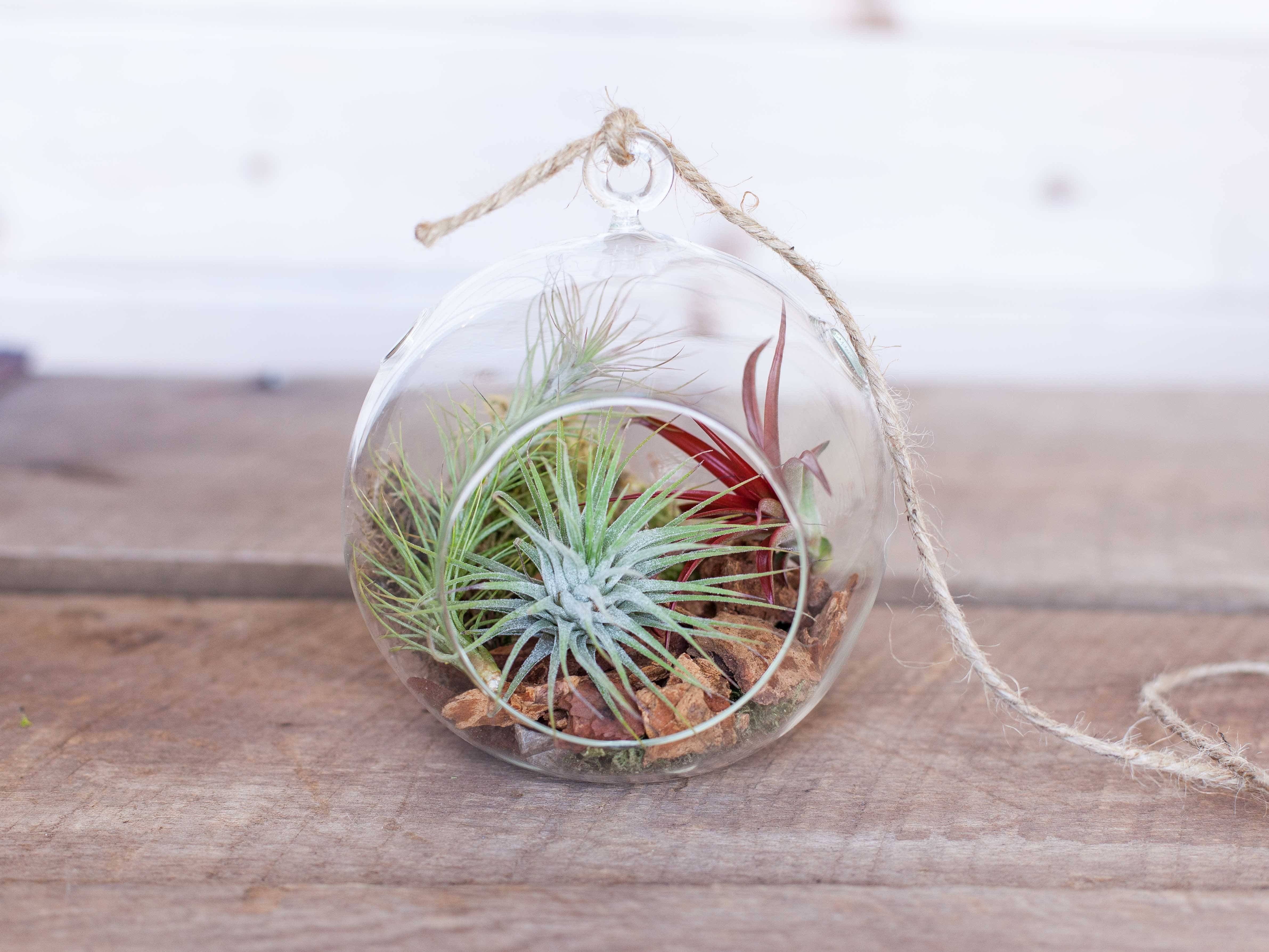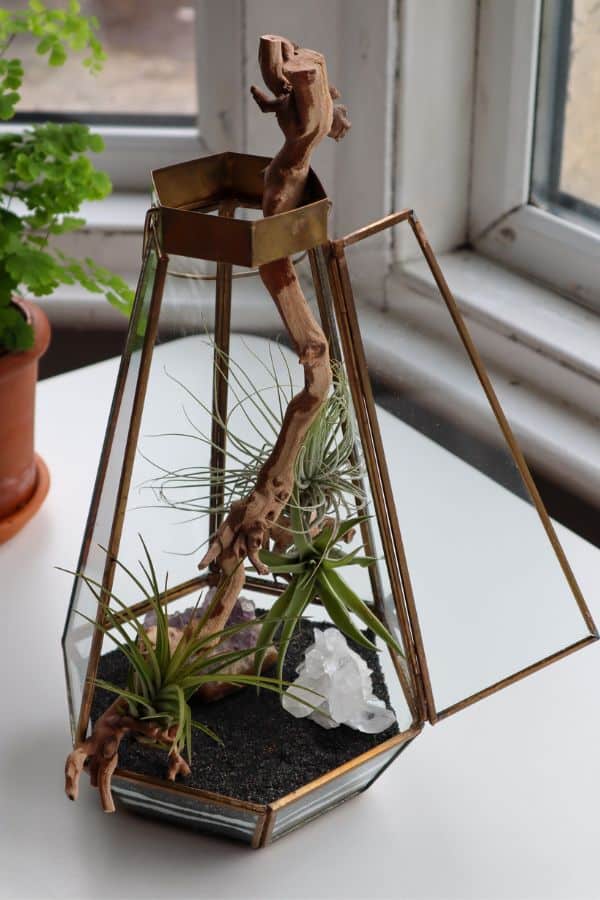Air plant terrariums are stylish and easy-to-maintain indoor gardens. They showcase air plants in creative glass containers.
Air plant terrariums are gaining popularity for their low maintenance and aesthetic appeal. They thrive without soil, absorbing moisture and nutrients from the air. This makes them perfect for busy individuals and small spaces. Air plants come in various shapes and sizes, allowing for endless design possibilities.
These terrariums can enhance any home or office decor. Simply mist the plants weekly and provide indirect sunlight to keep them healthy. Air plant terrariums are not just beautiful; they are also eco-friendly. They purify the air and add a touch of nature indoors. Create your own unique terrarium and enjoy a piece of nature at home.
Introduction To Air Plant Terrariums
Air plant terrariums are beautiful, low-maintenance decorations for your home. These small, glass containers house air plants, creating a mini garden. They bring a touch of nature indoors, brightening any space.
What Are Air Plants?
Air plants, also known as Tillandsia, do not need soil to grow. They absorb nutrients and water through their leaves. These plants are native to forests, mountains, and deserts in Central and South America.
Air plants come in various shapes and sizes. Some have curly leaves, while others are spiky. Their unique appearance makes them perfect for terrariums.
Benefits Of Indoor Greenery
Adding indoor greenery has many benefits for your home and health.
| Benefit | Description |
|---|---|
| Improved Air Quality | Plants help clean the air by removing toxins. |
| Stress Reduction | Greenery helps reduce stress and boosts mood. |
| Decoration | Plants add a natural, stylish touch to any room. |
Here are some key points about the benefits of indoor greenery:
- Improved Air Quality: Plants act as natural air purifiers.
- Stress Reduction: Having plants around can lower stress levels.
- Decoration: Air plants add beauty to any space.
Choosing The Right Air Plants
Selecting the perfect air plants is essential for a thriving terrarium. Not all air plants are the same. Each variety has unique needs and features. This guide helps you choose the best air plants for your terrarium.
Popular Varieties
There are many types of air plants. Each has its own charm. Here are some popular varieties:
- Tillandsia Ionantha: Compact and colorful, great for small spaces.
- Tillandsia Xerographica: Known as the “King of Air Plants”, it has large, curly leaves.
- Tillandsia Bulbosa: Unique twisted leaves, ideal for a striking look.
- Tillandsia Caput-Medusae: Named after Medusa, with snake-like leaves.
Factors To Consider
Choosing the right air plants involves considering several factors. Ensure you keep these in mind:
| Factor | Explanation |
|---|---|
| Light: | Air plants need bright, indirect light. |
| Size: | Choose plants that fit your terrarium space. |
| Watering Needs: | Some air plants need more water than others. |
| Appearance: | Select plants that match your style. |
By understanding these factors, you can ensure your air plants thrive. Happy planting!
Selecting The Perfect Terrarium
Choosing the right terrarium is crucial for your air plants. The right environment helps them thrive. Consider the types, size, and shape of your terrarium.
Types Of Terrariums
Terrariums come in various types. Each type offers unique benefits for your air plants. Some popular options include:
- Open Terrariums: Best for air circulation.
- Closed Terrariums: Maintain higher humidity.
- Hanging Terrariums: Save space and add visual interest.
- Tabletop Terrariums: Perfect for desks and shelves.
Size And Shape Considerations
The size and shape of your terrarium affect plant health. Choose wisely based on the needs of your air plants.
Size:
- Small terrariums fit compact spaces.
- Large terrariums offer more room for growth.
Shape:
- Round: Promotes even light distribution.
- Geometric: Adds a modern touch.
- Rectangular: Ideal for creating layers.
Consider these factors for a thriving air plant terrarium.
Creating Your Air Plant Terrarium
Creating your air plant terrarium is a fun and simple project. With a few materials and steps, you can craft a beautiful, low-maintenance display. Follow this guide to make your own unique terrarium.
Materials Needed
- Glass container (open or closed)
- Air plants (Tillandsia)
- Decorative sand or gravel
- Moss (reindeer or sheet moss)
- Small stones or pebbles
- Decorative items (shells, crystals, figurines)
- Spray bottle for misting
Step-by-step Guide
- Prepare your materials. Gather all items before starting. Choose a clean, clear container.
- Add a base layer. Place decorative sand or gravel at the bottom. This provides drainage.
- Add moss and stones. Arrange moss on top of the sand. Add small stones for texture.
- Place the air plants. Gently position air plants on the moss. Ensure they sit firmly.
- Decorate your terrarium. Add shells, crystals, or figurines around the plants. Be creative!
- Mist the air plants. Use a spray bottle to mist the plants lightly. Do this twice a week.
By following these steps, you create a lovely air plant terrarium. It adds beauty and greenery to any space.
Decorating Your Terrarium
Decorating your terrarium can be a fun and creative process. It allows you to express your personality and design sense. There are countless ways to make your air plant terrarium unique and beautiful.
Adding Decorative Elements
Adding decorative elements can transform your terrarium into a piece of art. Choose items that complement your air plants and fit your style.
- Rocks and Pebbles: Use colorful rocks or pebbles for a natural look.
- Moss: Add green moss for a lush, vibrant appearance.
- Shells: Seashells bring a beachy feel to your terrarium.
- Figurines: Small figurines can add a playful touch.
- Crystals: Crystals offer a mystical and elegant look.
Creative Design Ideas
Here are some creative design ideas to inspire you:
- Layering: Create layers with different materials. Use sand, pebbles, and moss.
- Mini Landscapes: Design a tiny landscape with hills, valleys, and paths.
- Color Themes: Stick to a color theme. Use matching elements for a cohesive look.
- Seasonal Themes: Decorate according to seasons. Try snowflakes for winter or flowers for spring.
- Nature-Inspired: Use natural elements. Incorporate sticks, leaves, and bark.
| Decorative Element | Effect |
|---|---|
| Rocks and Pebbles | Natural and colorful |
| Moss | Lush and vibrant |
| Shells | Beachy feel |
| Figurines | Playful touch |
| Crystals | Mystical and elegant |

Credit: www.air-plants.com
Caring For Your Air Plants
Air plants, also known as tillandsias, are unique and easy to care for. They don’t need soil to grow, making them perfect for terrariums. Follow these simple tips to keep your air plants healthy and happy.
Watering Tips
Watering air plants is simple but crucial. Here are some tips:
- Soak your air plants: Submerge them in water for 20-30 minutes once a week.
- Shake off excess water: Gently shake the plants to remove water from crevices.
- Mist regularly: Mist your air plants 2-3 times a week, especially in dry climates.
- Avoid standing water: Never let your air plants sit in water for long periods.
Light And Temperature Requirements
Proper light and temperature are vital for air plants. Here’s what they need:
| Light | Temperature |
|---|---|
| Indirect light: Place your air plants in bright, indirect light. | Optimal range: Keep them in temperatures between 50-90°F (10-32°C). |
| Artificial light: Use fluorescent or LED lights if natural light is limited. | Avoid extremes: Protect your plants from frost and extreme heat. |
With these simple tips, your air plants will thrive. Enjoy the beauty and simplicity of air plant terrariums in your home.
Troubleshooting Common Issues
Air plant terrariums are beautiful and easy to maintain. Yet, sometimes, problems can arise. Here are some tips to troubleshoot common issues.
Dealing With Pests
Pests can harm your air plants. Look out for small bugs or mold. Here are steps to handle pests:
- Inspect Regularly: Check plants every week for pests.
- Rinse Plants: Rinse air plants with water to remove pests.
- Use Neem Oil: Spray neem oil to kill pests.
Keep the terrarium clean to prevent pests. Remove dead leaves and debris.
Identifying Plant Stress
Stressed air plants may show signs of trouble. Here is how to identify stress:
- Color Change: Leaves turn brown or yellow.
- Dry Leaves: Leaves look dry or crispy.
- Soft Leaves: Leaves feel soft or mushy.
Provide the right care to reduce stress. Ensure proper light, water, and air circulation.
If leaves are brown, mist the plant more often. If leaves are soft, reduce watering.
Check the environment. Make sure there is enough light and fresh air.

Credit: www.cottageonbunkerhill.com
Incorporating Terrariums Into Home Decor
Air plant terrariums add a touch of nature to your home. Their unique look fits any style, from modern to rustic. They are low-maintenance, making them perfect for busy households. Let’s explore how to incorporate these delightful mini-gardens into your home decor.
Placement Ideas
Choosing the right spot for your terrarium enhances its beauty. Here are some ideas:
- Windowsills: Place terrariums where they get indirect sunlight.
- Coffee Tables: Use them as a centerpiece for a cozy vibe.
- Bookshelves: Add greenery to your reading nook.
- Bathrooms: Brighten up the space with a touch of nature.
- Kitchen Counters: Freshen up your cooking area with a small terrarium.
Seasonal Decor Changes
Update your terrariums to match the seasons. This keeps your home decor fresh and exciting. Follow these ideas for each season:
| Season | Decor Ideas |
|---|---|
| Spring | Add pastel-colored stones and mini flowers. |
| Summer | Include bright, vibrant elements like seashells or coral pieces. |
| Fall | Use warm tones with small pumpkins or autumn leaves. |
| Winter | Incorporate snowflake ornaments and silver accents. |
Updating your air plant terrariums with seasonal touches adds charm. It makes your home feel welcoming all year round.

Credit: terrariumtribe.com
Conclusion
Air plant terrariums are a beautiful addition to any space. They require minimal care and enhance your decor effortlessly. These unique plants thrive in various conditions, making them perfect for beginners. Create your own stunning terrarium and enjoy the natural beauty it brings to your home or office.
